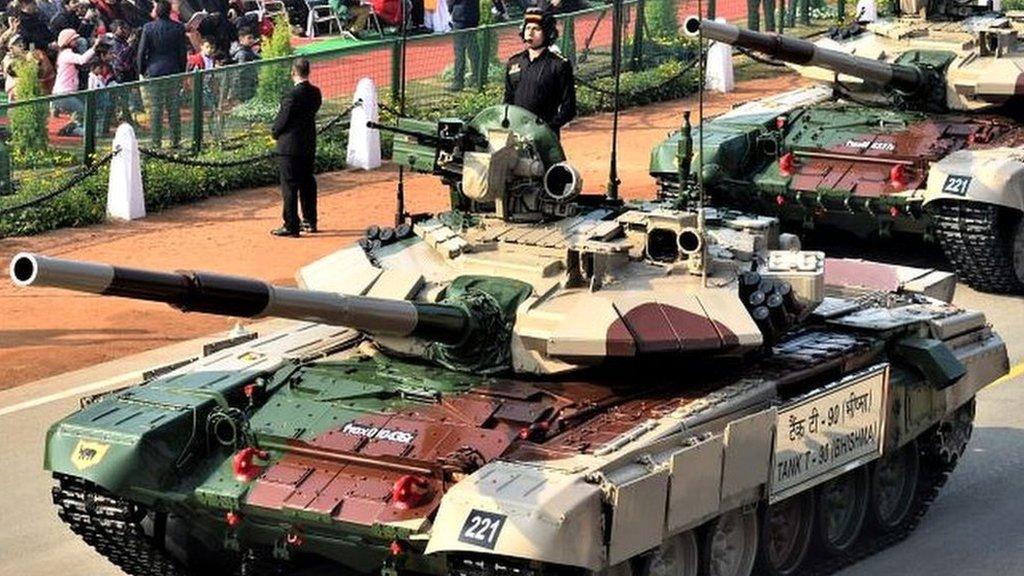Quad: The China factor at the heart of the summit
- Published
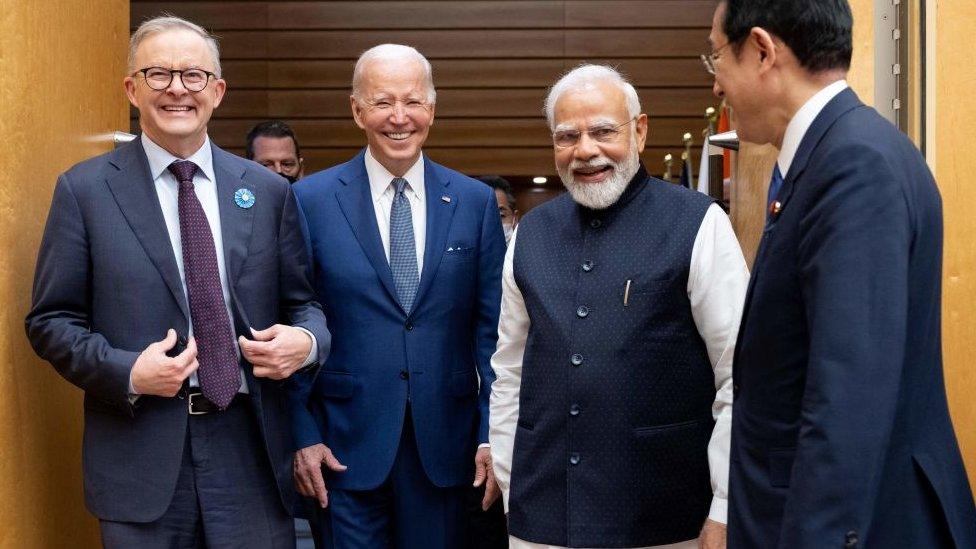
The Quad leaders are meeting in Tokyo
Leaders of the Quad nations are meeting in Tokyo on Tuesday in what can be described as one of the most important meetings in recent years that will affect the geopolitics and security of the Indo-Pacific region.
The group - composed of Japan, the US, Australia and India - seems to be emerging from the shadows of the Covid-19 pandemic and, to some degree, from Russia's invasion of Ukraine as well.
The top leaders are gathering for the fourth time - they have already met once in Washington last September and twice virtually - in less than two years. That underscores the importance of the Quad, which was largely just a concept until 2017.
That year, then-US President Donald Trump revived the group in a bid to take on China in its own backyard.
But analysts say the steady decline in each Quad nation's bilateral ties with China in the past few years appears to have given it new impetus.
Michael Kugelman, deputy director at the Wilson Center think-tank, says the latest meeting is likely to sharply focus on the Indo-Pacific.
"With the pandemic in the rear-view mirror and an understanding over India's stand on Ukraine, the Quad will get down to focusing on its core business of ensuring an open and free Indo-Pacific," he says.
India has so far refused to directly criticise Russia over its war in Ukraine but it has reiterated the importance of respecting the sovereignty of each nation.
After initial anger against India's stand, the US and other Western countries seem to have understood Delhi's position.
The 2+2 Dialogue - attended by the foreign and defence ministers of the US and India - in April helped smooth their differences over Ukraine.
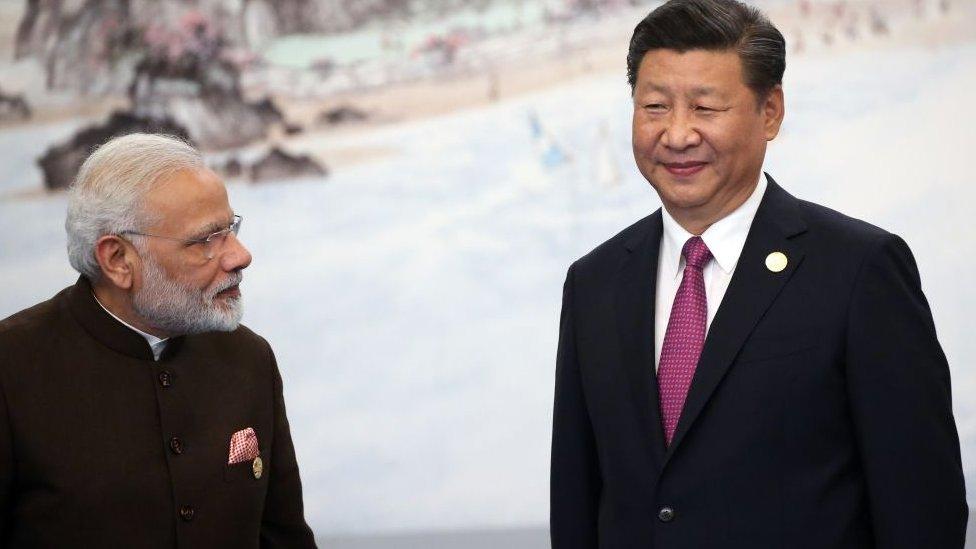
India-China relations have deteriorated in recent years after promising signs when Narendra Modi was elected in 2014
The US has acknowledged that India's heavy dependence on Russia for its defence imports could not be overlooked.
So the Quad will focus on mutual points of convergence - and China is the biggest of these.
China has become increasingly assertive in the region, with ongoing maritime disputes with several countries and a land boundary conflict with India.
Beijing is investing heavily in strengthening its navy and its recent security pact with the Solomon Islands has stoked fears in Australia. A leaked draft of the agreement - which was verified by the Australian government - said Chinese warships would be permitted to dock on the islands and that Beijing could send security forces "to assist in maintaining social order".
It will be interesting to see how Anthony Albanese, Australia's newly elected PM, deals with this threat and how he raises the issue within the Quad framework.
Japan, for its part, has become increasingly wary of what it calls routine "incursions" from the Chinese navy.
As for the US, it is evident that it wants to protect its interests in the region.
The launch of the US-led Indo-Pacific Economic Framework (IPEF), which has 13 regional players, is a step in that direction. It aims to promote regional growth, sustainability and inclusivity in the region.
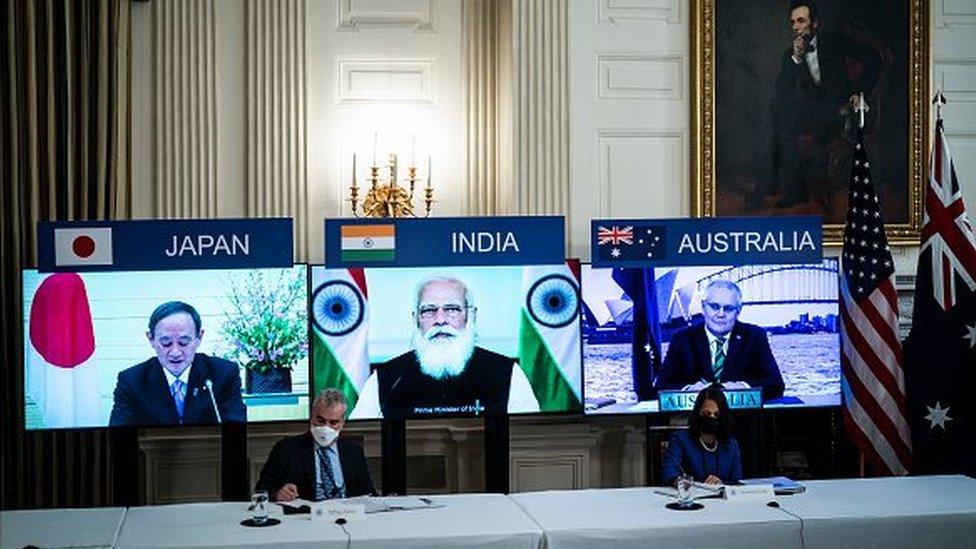
Two recent Quad summits took place virtually
It comes on the back of US President Joe Biden's recent meeting with the Association of South East Asian Nations (Asean) leaders in Washington.
The region's importance can be understood from the fact that it has some of the world's most heavily used shipping lanes, including the Strait of Malacca. Around 30-40% of the world's trade, including goods and crude oil, passes through these lanes.
So when Indian PM Narendra Modi, Mr Biden, Mr Albanese and Japanese PM Fumio Kishida meet in Tokyo, they may not mention China directly - but regional security will be on top of their agenda.
The Quad has several working groups, including on cybersecurity, health, infrastructure and education, but it has not explicitly spoken about any defence co-operation.
However, it's likely to announce a joint strategy to tackle illegal fishing in the Indo-Pacific region - which analysts say is largely aimed at China.
Mr Kugelman says this announcement would be quite significant because it involves the use of satellite imagery and active intelligence sharing - which will have security implications.
But he adds that the group will need to do a lot more before Asean nations see it as a major counterbalance to China.
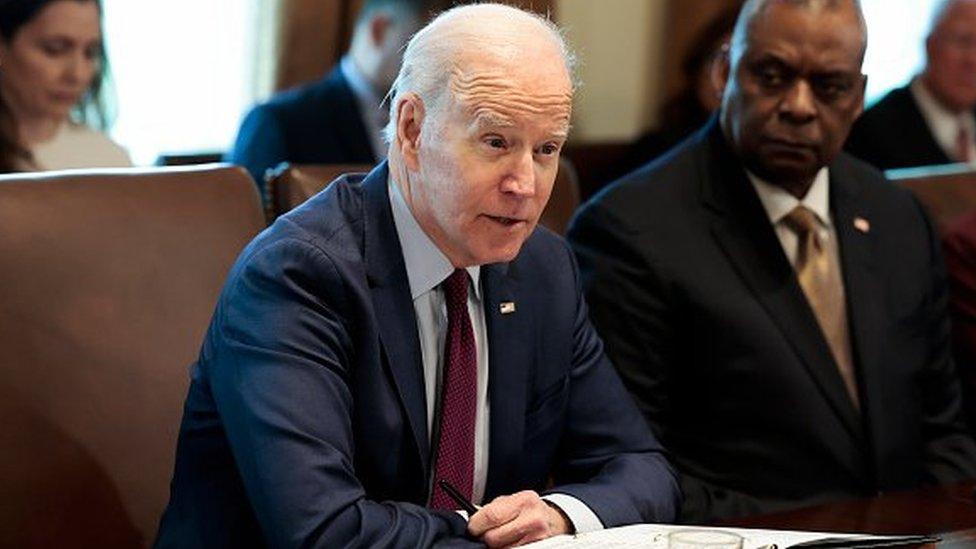
Mr Biden's administration has said it is committed to an open and fair Indo-Pacific
It's not that there is no defence angle to the Quad. The four countries, and a few others, have taken part in India's Malabar naval exercises, and issues such as Afghanistan and North Korea's nuclear programme have been discussed at the Quad. Mr Biden recently warned China that the US would intervene militarily to protect the island if it is attacked.
But Mr Kugelman points out that both Asean and Quad nations have significant trading volumes with China and they will try to avoid any direct confrontation with Beijing - at least until the Quad can emerge as a net security provider in the region.
Moreover, Delhi is a partner with Beijing in several multilateral forums, including Brics - which also includes Russia, South Africa and Brazil.
"The Quad has come a long way but it still has an informal structure and has no secretariat. So, it needs to keep evolving," Mr Kugelman says.
Meanwhile, Russia's growing ties with China will most likely feature as well as they don't suit Delhi's geopolitical calculations.

The Quad will discuss the Ukraine war but it won't be the focus of the meeting
Some analysts have predicted that the Ukraine war may "send Russia into China's arms" and Beijing might be able to persuade Moscow to increase its presence in the Indo-Pacific.
If that happens, it will upset Delhi's interests the most as it has close ties with Russia and an ongoing dispute with China.
It's just a scenario at the moment, Mr Kugelman says, but one that can't be completely overruled, especially since Russia has been quite critical of the Quad.
Beijing's initial reaction to the Quad was to dismiss it, saying the group would "dissipate like sea foam". But it later sharpened its criticism of the group, calling it the "Asian Nato".
On Sunday, Chinese Foreign Minister Wang Yi said the Quad was formed "to contain China".
With such hardening of positions from both sides, Asean nations - some of whom have active maritime disputes with China - may find themselves between what one analyst called "a rock and a hard place".

The Quad: The basics
Who is in the Quad? The Quadrilateral Security Dialogue brings together the US, Japan, Australia and India. It began as a loose grouping to provide aid following the 2004 Indian Ocean tsunami and was relaunched in 2017.
What are its aims? With its focus on the Indo-Pacific, the Quad says it backs the free and open, rules-based global order - it's unstated goal is containing an increasingly assertive China in its backyard. Member nations' ties with China have deteriorated in recent years.
What's at stake? The US must persuade its allies - united by concern at China's rise but differing on other issues - that it's committed to a region seen as key to global security and prosperity. China says the region should beware what it calls the "Asian Nato".
- Published25 March 2022
- Published13 May 2022
